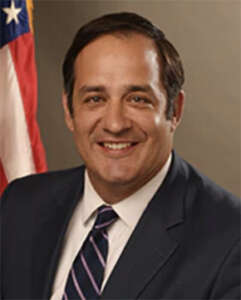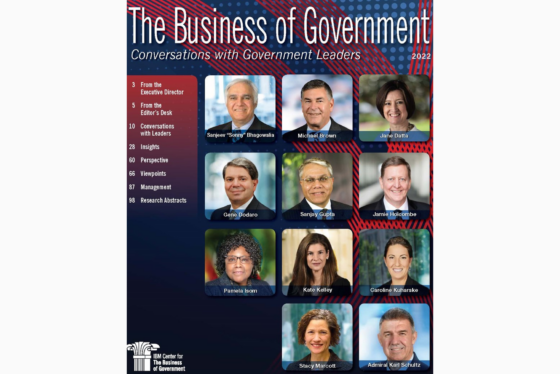Insight By Business Of Government Hour
HHS IT strategy: a conversation with Jose Arrieta
This content is provided by the IBM Center for the Business of Government. Mondays at 11:00 a.m. & Fridays at 1:00 p.m. The Business of Government Radio Hour,...
This content is provided by the IBM Center for the Business of Government.
Mondays at 11:00 a.m. & Fridays at 1:00 p.m.
The Business of Government Radio Hour, hosted by Michael J. Keegan, features a conversation with a federal executive who is changing the way government does business. The executives discuss their careers and the management challenges facing their organizations. Guests include administrators, chief financial officers, chief information officers, chief operating officers, commissioners, controllers, directors, and undersecretaries.
ON THIS WEEK’S SHOW:
What is the HHS IT strategy? How is HHS changing the way the department does IT? Join host Michael Keegan as he explores these questions and more with Jose Arrieta, Chief Information Officer, US Department of Health and Human Services.
LISTEN TO THE FULL SHOW:
GUEST BIOGRAPHY:
In May 2018 José Arrieta was appointed as the Chief Information Officer (CIO) for the Department. 
As the CIO, José provides leadership and oversight of the Department’s $6.3B IT portfolio in support of the Department’s expansive mission to enhance the health and well-being of Americans by providing for effective health and human services and by fostering sound, sustained advances in science underlying medicine, public health, and social services. He is responsible for providing assistance and guidance on the use of technology-supported business process reengineering; investment analysis; performance measurement; strategic development and application of information systems and infrastructure; policies to provide improved management of information resources and technology; and better, more efficient service to our HHS clients and employees. José leads the development of HHS-wide IT strategy with an immediate focus on cybersecurity, cloud computing, and emerging technology. In addition, José provides advice and counsel to the Secretary and Deputy Secretary on how to advance the Department’s mission through the use of transformative information technology approaches.
José brings over 15 years expertise in policy, procurement and technology solutions to HHS. He has deep experience in all phases of the acquisition life cycle and has served in a broad range of roles including contracting officer, budget manager, financial manager, small business executive, ombudsman, and program manager. He is a respected leader in applying emerging technologies, especially blockchain, artificial intelligence and robotic process automation, to the Federal acquisition process and mission critical program challenges.
He is actively engaged in the academic community, and currently serves at the University of Virginia and Johns Hopkins University as an Adjunct Professor focused on Blockchain, Business Management, and Public Procurement. He also serves as an advisor to the Dean of the Kogod Business School at American University and provides guidance on the creation of a data science lab that is exploring the use of blockchain.
Prior to becoming the CIO, from January 2018 to May 2018, Jose served as the Associate Deputy Assistant Secretary for Acquisition, Acting Deputy Assistant Secretary for the Office of Grants and Acquisition Policy and Accountability, the Senior Procurement Official and the Small Business Executive. José successfully built and began to implement the first fully functioning blockchain coupled with artificial intelligence and machine learning for public procurement, in the world. The core of the acquisition program, HHS Accelerate, was built in 7 weeks and achieved Authority to Operate in December 2018.
As the Former Director of Schedule 70 Operations with the General Services Administration (GSA), José led the largest IT contract in the world. It averaged $15B /year in business volume, providing IT products and services to federal, state, and local customers. In 2017, José successfully delivered a proof of concept that automated contract awards and reduced cycle time for contract awards and modification by 90%, by introducing the blockchain and machine learning into GSA’s IT Schedule 70’s business process.
Before that José was the first Senior Executive Director of the Office of Small Disadvantaged Business Utilization for the Department of the Treasury. Treasury spent ~$1.2B with small business in FY14. José was Treasury’s representative to the National Security Council and focused on the impact of blockchain on the U.S. national security posture.
From 2012—2014, José served as the first Procurement Ombudsman for the Department of Homeland Security (DHS). He managed vendor relationships with 15K DHS industry partners and developed an innovative model to train 10K members of the DHS acquisition workforce on how industry does business.
From 2010—2012 José served in two roles for the Transportation Security Administration as a Program Manager and Finance Chief for the Office of Intelligence & Analysis. He planned and developed requirements for major IT acquisitions, managed the budget formulation & execution process, and provided performance oversight for a portfolio of 7 geographically dispersed risk based, intelligence driven, program offices. The portfolio he managed invested $500M/year through 78 major contracts (80% high risk) that supported enrollment, vetting, and adjudication of 22M people every 20 seconds, 24 hours a day, 7 days a week, at 99.99999% operability.
José began his Government career as an acquisition intern at GSA. In his last position at GSA, he served as a Lead Contracting Officer with an unlimited warrant, leading the supply chain modernization effort. He focused on high dollar value, highly complex, politically sensitive supply chain, 4th party logistics acquisitions supporting military activities in the United States and the Middle East.
Copyright © 2025 Federal News Network. All rights reserved. This website is not intended for users located within the European Economic Area.





